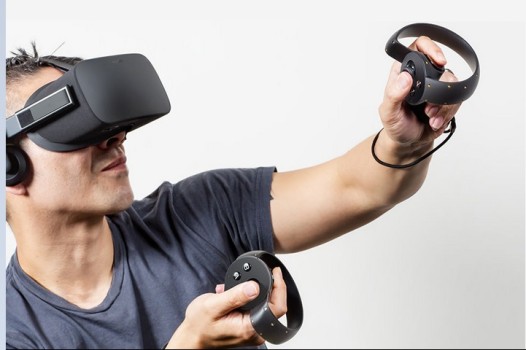
There’s a battle raging now for who will be the dominant platform of the coming virtual reality metaverse.
Facebook, which has been getting a big chunk of the media attention with the Oculus Rift Kickstarter and its $2 billion acquisition, has suffered a few blows lately, even as rival Google picks up steam.
I’m not including Sony in this race because while its Playstation VR platform seems to be doing very well, it’s a gaming platform, and will likely coexist along side any eventual general-purpose platform. It has a good price point for mainstream adoption by video game enthusiasts, good relationships with developers, a strong brand, and a large install base of the console itself. But, just as consoles don’t compete directly with personal computers, laptops, and mobile devices, I don’t think that the Playstation’s closed ecosystem and strong gaming focus will broaden its appeal much beyond games and media consumption.
The sh*t-memes scandal
Virtual reality developers and early enthusiasts were already annoyed that Oculus had sold out to Facebook, then annoyed again when Oculus — temporarily — went back on a promise to allow compatibility for other platforms, such as the HTC Vive.
But when Oculus founder Palmer Luckey was discovered to have given money to a racist, sexist, pro-Trump, anti-Clinton “sh*t memes” campaign, developers started backing away from the platform. Luckey, formerly the company’s poster boy and gee-whiz mascot, was also notably absent from the Oculus Connect conference earlier this month.
Sure, an occasional embarrassment like this does not, by itself, necessarily doom a company. But it does leave a bad taste in people’s mouths, especially at a time when the industry is trying hard to deal with its diversity issues.
When given a choice of two platform that are generally running neck-and-neck, why not go with one that has a slightly better technology, instead — and is headed by a woman, HTC’s Cher Wang?
The Samsung disaster
Of course, the best-selling hardware running Oculus software isn’t actually the Oculus Rift. It’s the Samsung Gear VR, which has reported over a million units sold.
It works with late-model Samsung phones, costs just $99, and was bundled free with new phones this year. The quality isn’t as good as that of the tethered sets, but is up there, and certainly the best available on a mobile-based platform.
Then Samsung phones started exploding, the company refused to give refunds for the Gear VRs — and Google just out-innovated it with its new Daydream platform.
The brand is not dead, but it’s definitely tarnished, and will take time to recover.
The controller issue
The Oculus Rift launched with a standard gamepad-style controller, not the motion controllers like those of the HTC Vive. The Oculus Touch motion controllers only became available for pre-order this month, and delivery won’t start until December.
Ouch.
The price problem
Why bother getting a high-end tethered headset when you can get a Playstation VR for half the price? One reason is room-scale virtual reality — being able to actually move around inside a virtual environment.
But you need more than just a high-end computer, headset and controllers for that. You also need sensors that can detect your movement.
Here is how much it will cost you to get room scale VRÂ with the Oculus Rift, on top of the new VR-capable computer you will have to buy:
- Oculus Rift headset: $600
- Oculus Touch controllers: $200
- Additional sensor for room-scale VR: $80
Total: $880
Here is how much it will cost you to get the same setup with the HTC Vive. Again, you’ll need to start with a VR-capable computer. In addition, you will need:
- HTC Vive headset: $800
- Controllers: included
- Base station sensors for room-scale VR: included
Total: $800
If you’re the kind of person who isn’t satisfied with the Playstation VR and and need a really high-end experience, and are willing to pay for it, why not go all the way to the HTC Vive, and get a better product, at an equal or slightly lower cost?
Tethered virtual reality — where you connect a headset to a computer — is a niche use case, anyway for the home user. It’s more appropriate for enterprise settings such as manufacturing prototypes and medical training simulations, and for video arcades. And HTC has been gaining ground in this area, with hundreds of arcades in Asia expected to be on the platform this year, and a couple of thousand next year.
Oculus hasn’t released their sales numbers, but HTC just said that they’ve sold 140,000 headsets since they launched in April.
According to a July report, Facebook plans to sell 400,000 Oculus Rifts by the end of this year, but it’s impossible to know whether they’re on track, and if the Vive is peeling off customers on the high end and the Playstation VR on the low end.
- OSCC 2024 Submission Deadline Approaching - October 19, 2024
- AvatarLife Viewer adds video calls, screen sharing - October 19, 2024
- Spooky season brings more visitors to OpenSim worlds - October 15, 2024
